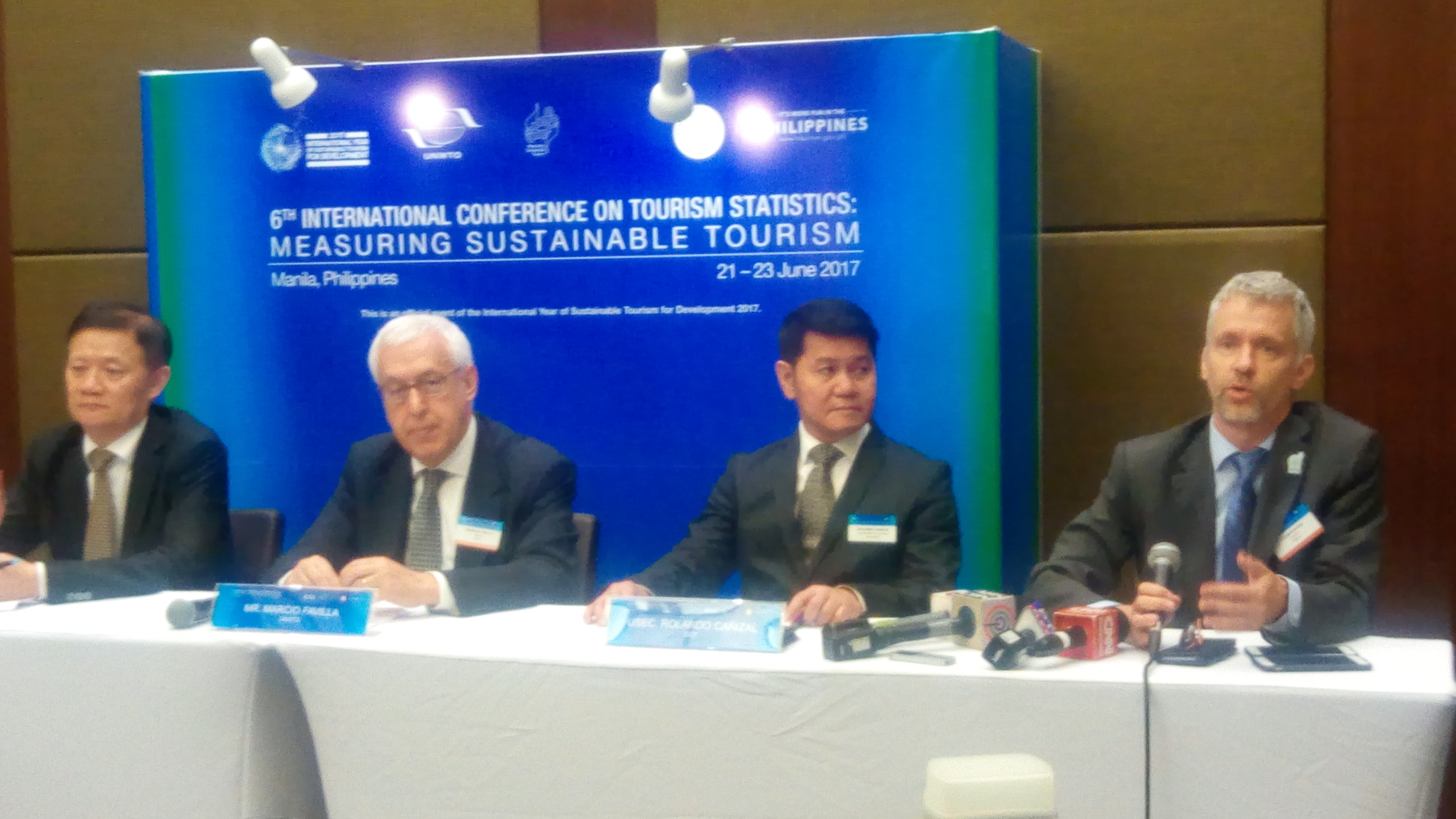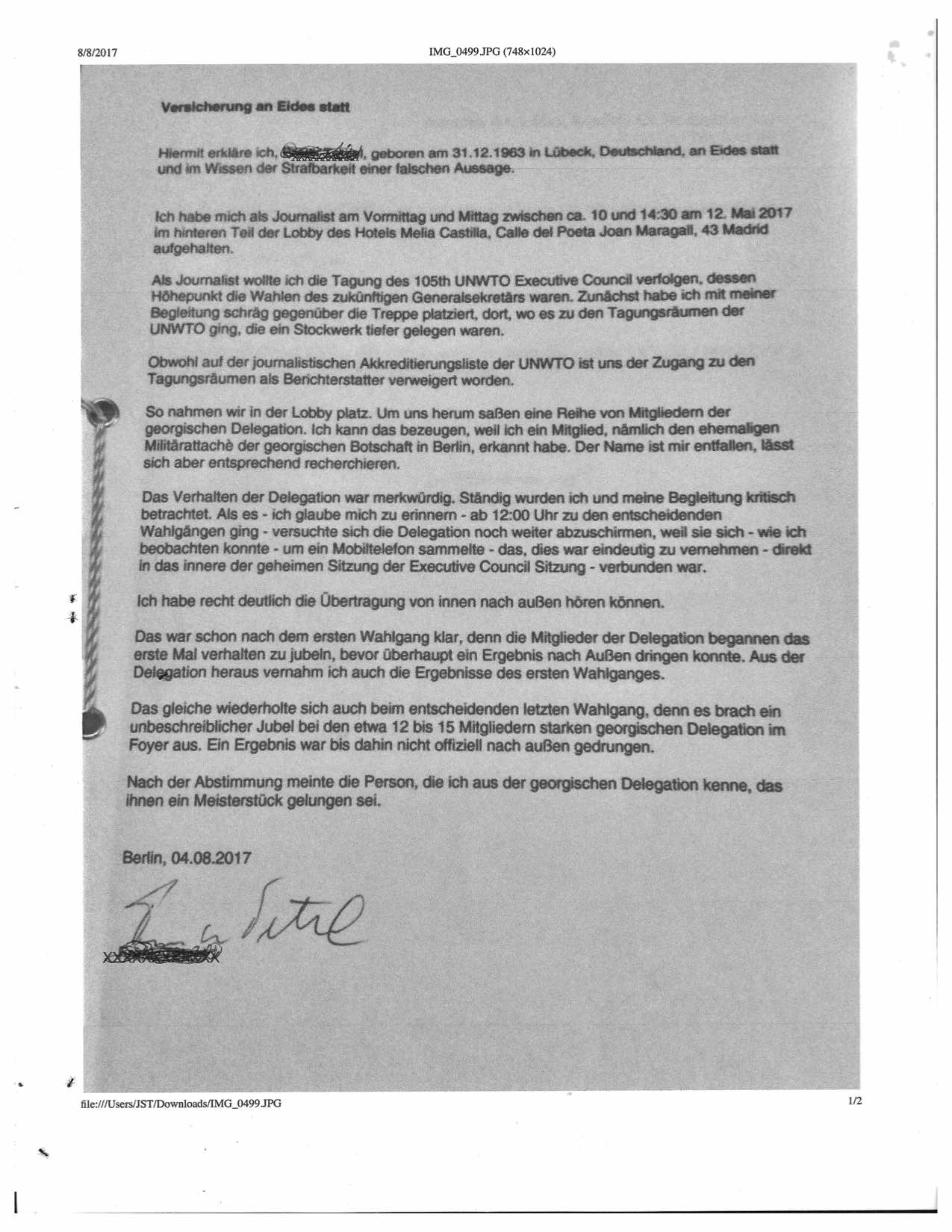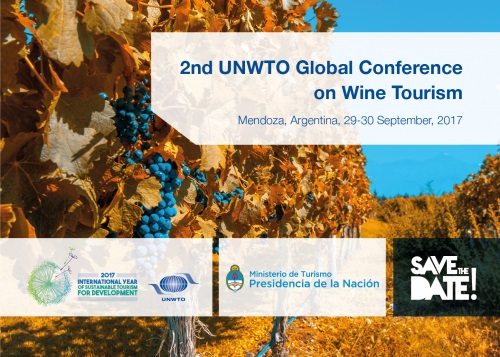

To UNWTO Executive Council members: There is no shame to correct your mistake
Tourism is directly related to international security, communication, and interaction between people. Tourism must have a seat at the global table, and the UN World Tourism Organization (UNWTO) is the platform for that within the United Nations. How can the leader of this UNWTO platform be elected by a group of country representatives that care more about getting tickets for a popular football game, are following the orders of their foreign minister, and perhaps therefore are not interested in a discussion and exchange, before voting someone into the highest UN official in the travel and tourism industry?
This is exactly what happened in Madrid during the last UNWTO Executive Council meeting, and it seems only one man is trying to correct it. This man is Dr. Walter Mzembi, the Minister of Tourism and Hospitality from what some say is the most politically-disliked countries – Zimbabwe.
What we should learn here is that it’s not about the country this man represents, it’s about the issue that has merit.
Worldtourismwire reported in detail about the football game delegates were invited to by the Georgian candidate. WorldTourismWire conducted a survey that overwhelmingly confirmed attending this football game as a voting delegate and accepting the invitation by a delegate seeking your vote, is a clear case of bribery.
All executive member countries – Angola, Azerbaijan, Bahamas, Bulgaria, China, Costa Rica, Croatia, Democratic Republic of the Congo, Ecuador, Egypt, France, Germany, Ghana, India, Iran (Islamic Republic of), Italy, Japan, Kenya, Mexico, Morocco, Mozambique, Peru, Portugal, Republic of Korea, Saudi Arabia, Serbia, Seychelles, Slovakia, South Africa, Spain, Thailand, Tunisia, and Zambia – were very much aware of controversial issues leading to the vote for a new UNWTO nominee.
During the restricted meeting established by rule so voting members of the Executive Council could discuss qualifications and the presentation of competing candidates the French delegate apparently said “We heard enough, let’s move to vote.” He wanted to skip a discussion on the presentation and qualification by candidates that competed for the UNWTO Secretary General post. Information received by eTN confirmed there was no formal motion and there was no second motion. Instead, there was silence by Executive Council delegates when the French candidate suggested voting without discussion because it was late. If this was true, it would have been simply disrespectful to not have a debate, especially after all the months of hard work these candidates put into the election. It was also clearly not following a proper protocol that a motion was not made and seconded to vote on whether the debate should be skipped in the first place.
The world needs leaders. Tourism ministers, especially those elected to sit on the UNWTO Executive Council, have a responsibility not only to their own country but to the global world of travel and tourism. To make matters worse, the same delegates at an earlier Executive Council meeting in Luxor, Egypt, voted to ban all recordings during the debate, so there would be no official record that this discussion ever took place. Maybe a good legal argument to investigate if such a rule of interpretation is actually allowed at a UN agency is in order.
To summarize, the nominee from Georgia, Zurab Pololikashvili, Ambassador of Georgia to the Kingdom of Spain, was elected without discussion of his presentation, and his qualifications were not questioned. The same nominee was allowed to invite Executive Council officials to a football game before the election meeting, and his embassy circulated tickets to this potential target audience for the nominee.
During the election process, there was no recording of the debate – a debate that in reality never took place, but the elected nominee attended and possibly influenced this restricted meeting via SKYPE from the hotel lobby of the Casa, which is clearly against the rules and possibly influenced the decision to not have a debate.
The world is going into unchartered times, and tourism needs leaders. The delegates of the Executive Council made a mistake to vote without debate and most of them didn’t know they were being watched on SKYPE by the Secretary General nominee.
UNWTO Secretary General candidates – Mr. Márcio Favilla of Brazil, Mr. Jaime Alberto Cabal Sanclemente of Colombia, Mrs. Young-shim Dho of the Republic of Korea, – must do the right thing and stand behind Walter Mzembi’s effort to not confirm Zurab in China. It’s not too late for the members of the Executive Council to quietly admit a mistake and urge their countries not to vote for Zurab.
This takes leadership, and it takes guts, and it would demonstrate to the world that the delegates are united in wanting to correct this error. It would bring this issue back to the Executive Council who would then have the chance to confirm or correct their original vote.
There is no shame in doing this, but it would be shameful and a disgrace for world tourism if the confirmation of the current nominee took place in Chengdu as if it was business as usual, no questions asked.
The expected pretense of the Georgian Prime Minister, Giorgi Kvirikashvili, should not influence world tourism leaders to not care about correcting a mistake.Kvirkashvili is scheduled to attend the upcoming UNWTO General Assembly in Chengdu China in September.
World peace is at stake, and tourism is a peace industry. Tourism must have its foundation on solid footing. Under the leadership of a duly elected new Secretary General the need to change the process and rules in UNWTO to avoid such an incident in the future is necessary.

Sworn statement: UNWTO nominee Zurab Pololikashvili conspired to attend restricted election meeting
It was at the Meliá Castilla Hotel in Madrid on May 12, 2017 when a known German journalist for Huffington Post was in the lobby of the hotel. It was the day the UNWTO Executive committee elected a nominee for the position of the UNWTO Secretary General. According to the rules of procedure and calendar for the election of the Secretary General of the Organization for the period 2018-21, rule 5 (e) states: The election of one nominee by the Council shall be conducted, in accordance with Rule 29 of the Councils rules of Procedure, during a private meeting, part of which shall be a restrictive meeting as follows:
(i) discussion of candidates shall be conducted during a restrictive private meeting at which only voting delegations and interpreters shall be present; there shall be no written record and no tape recording of the discussions.
Delegates competing for the job made their presentation and previously presented their credentials and qualifications. Anyone would think the secret discussion among members of the executive council is important and will have a great influence on the final vote.
Out of obvious reasons delegates were not allowed to be part of this secret meeting.
Candidate Ambassador Pololikashvili from Georgia was one of the candidates competing for the UNWTO Secretary General nomination and had to wait outside the room for the discussion to end and the vote to be conducted.
What about if he was secretly attending the meeting by SKYPE using his Smartphone? What about him talking to his collaborator in a conspiracy to influence the voting process? WorldTourismWire had alleged this for some time and is now able to report about a sworn statement a German journalist who writes for Huffington Post presented to a notary or judge on August 4, 2017 in Berlin.
He stated under oath:
Herewith I declare under oath: I was born on December 31, 1963 in Luebeck, Germany. I am aware of the criminal penalties involved in giving a false statement.
I am a journalist and spent the morning and early afternoon on May 12 in the back of the hotel lobby at the Melia Castilla, Calle del Poeta Joan Maragall, 43 Madrid.
I was covering the 105th meeting of the UNWTO Executive Council. The highlight of the event was the election of the future Secretary General. First I sat with my assistant close to the stairs, so I could overlook the meeting rooms. They were located one floor below. Even though I was accredited as a journalist UNWTO did not allow us to enter the meeting rooms.
Therefore we sat in the lobby. Close to us, I noticed a number of people belonging to the Georgian delegation. I was able to testify to this since I noticed one member of the group, a former military attache at the Georgian embassy in Berlin. I cannot remember the name, but I could easily research.
The behavior of the group was strange. I was constantly watched with suspicion. When the election came closer (around 12.00 noon), the group tried to isolate themselves a bit more. They were all gathering around a mobile phone. I was able to (without a doubt) see the phone was connected directly to the restricted meeting of the Executive Council.
I was able to hear the broadcast from the meeting quite clearly After the apparent first round of the election delegates started to cheer. It happened before any indication was available from the room to anyone outside. I understood the delegation reported the result of the first election round.
The same situation repeated itself at the final election round. A loud cheer started among the 12-15 members of the Georgian delegation in the hotel foyer. The result was not known outside the election room at that time.
After the election, a person and member of the Georgian Delegation and a person I knew said they (The Georgians) were able to pull a “masterpiece.”
END OF STATEMENT.
eTN publisher Juergen T Steinmetz was sitting in the same area and was talking to the ZImbabwe candidate Hon. Walter Mzembi. He clearly noticed the person on the phone was Ambassador Zurab Pololikashvili, now a nominee for Secretary General of the UNWTO.

Argentina’s Mendoza to host 2nd UNWTO Global Conference on Wine Tourism
World Tourism Organization (UNWTO) and the Ministry of Tourism of Argentina are pleased to announce that the 2nd UNWTO Global Conference on Wine Tourism will take place on 29-30 September, 2017 in Mendoza, Argentina.
Following the success of the 1st edition, which took place in the Kakheti Region, Georgia, in September 2016, this upcoming edition will be held in the Province of Mendoza. This region, known as the heart of Argentine winemaking, accounts for 70% of the national production of wine and about 85% of the bottled wine sales. The identity of Mendoza is strongly linked to wine and it is an ideal venue offering participants the opportunity to experience firsthand a variety of wine tourism projects, linking both the public and private actors of the tourism and wine sectors. Against the majestic backdrop of the Argentinian Andes, Mendoza is located on one of the highest mountain ranges in the world which subsequently produces some of the world’s greatest wines.
Furthermore, as this second edition falls within the framework of the 2017 International Year of Sustainable Tourism for Development, the former will be the core overarching theme of the conference. The International Year aims to support a change in policies, business practices and consumer behavior towards a more sustainable tourism sector that can contribute to the Sustainable Development Goals (SDGs). The link between wine tourism and sustainability also aligns with the 2030 Universal Agenda for Sustainable Development and the SDGs. In that respect, the Conference will be dedicated to strengthening the relationship between sustainability and wine tourism, highlighting the valuable role of wine tourism on the sustainable development of tourism destinations.
The Conference will include working sessions taking place in wine tourism venues throughout the province, giving all participants the opportunity to further explore the topics addressed in the sessions and interactively share and exchange ideas. Participants will have the opportunity to participate in a technical visit of one of the listed wineries and participate in workshop following the visit. Said workshop will explore the concepts introduced during the morning sessions in a pragmatic way. Ultimately, the groups will participate in an interactive session to draw the most relevant conclusions that will later be incorporated into the conference brief.
Share this:
